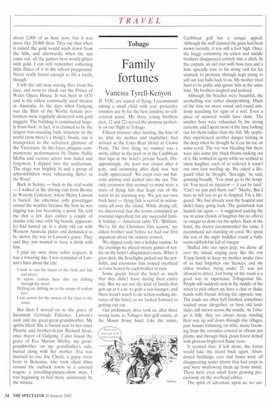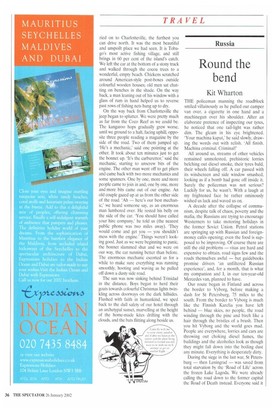Tobago
Family fortunes
Vanessa Tyrell-Kenyon
IF YOU are scared of flying, I recommend taking a small child with you: protective instincts are by far the best antidote to selfcentred panic. My three young brothers (ten, 12 and 22) served the purpose perfectly on our flight to Tobago.
Fifteen minutes after landing, the four of us, plus my mother and stepfather, had arrived at the Coco Reef Hotel at Crown Point. The first thing we wanted was a swim, either in the pool or in the Caribbean that laps at the hotel's private beach. Disappointingly, the pool was closed after 6 p.m., and swimming after dark was 'not really appreciated'. We crept over our balcony anyway and dashed into the sea. The only creatures that seemed to mind were a mass of flying fish that leapt out of the water in an alarming way. We got our own back later — flying fish is served in restaurants all over the island, While drying off, we discovered that the rooms contained an essential ingredient for any successful family holiday — American cable TV. 'Brilliant We've hit the Christmas film season,' my eldest brother said before we had our first argument about the remote control.
We slipped easily into a holiday routine. In the evenings we played sweaty games of tennis on the hotel's dilapidated courts. When it grew dark, the floodlights picked out the potholes, and enormous bats looped overhead as I was beaten by each brother in turn.
Some guests loved the hotel so much that they didn't leave during their entire stay. But we are not the kind of family that gets up at 6 a.m. to grab a sun-lounger, and there wasn't much to do within walking distance of the hotel; so we looked forward to getting our car.
Our preliminary drive took us, after three wrong turns, to Tobago's first golf course, at the Mount Irvine hotel. Like the tennis, Caribbean golf has a unique appeal. Although the staff claimed the grass had been mown recently, it was still a foot high. Once, the buggy containing my eldest and middle brothers disappeared entirely into a ditch. In the carpark, an old man with boss eyes and a hole specially torn in his string vest for his stomach to protrude through kept trying to sell our lost balls back to us. My mother tried hard to be polite and ignore him at the same time. My brothers laughed and pointed.
Although the beaches were beautiful, the snorkelling was rather disappointing. Much of the time we swam round and round aimlessly searching for signs of a reef. Even a piece of seaweed would have done. The smaller boys were exhausted by the strong currents, and I spent most of the time looking out for them rather than the fish. My stepfather experienced another danger lurking in the deep when he thought he'd cut his toe on some coral, The toe was bleeding but there were also some tiny black thorns sticking out of it. He writhed in agony while we writhed in silent laughter, each of us relieved it wasn't our own foot swelling up. We asked a lifeguard what he thought. `Sea-eggs,' he said, grinning broadly. 'You must go to the hospital. You need an injection — it can be fatal,' 'Can't we just pull them out?"Maybe. But I have to tell you to go to hospital. I'm a lifeguard.' We had already seen the hospital and didn't fancy going back. The guidebook was hauled out again — it suggested soaking the toe in urine (howls of laughter but no offers) or vinegar to draw out the spikes. Back at the hotel, the doctor recommended the same. I recommend not standing on coral. We spent the rest of the night huddled round a bathroom rubbish-bin full of vinegar.
Stuffed into our open jeep, we drove all over the island, singing away like the von Trapp family to keep my mother awake (two of us had forgotten our licences, and my eldest brother, being under 25, was not allowed to drive). Just being on the roads is a good way to experience Tobagonian life. People will suddenly stop in the middle of the street to pick others up, have a chat or shake hands with friends driving the opposite way. The roads are often half finished, sometimes washed away altogether, or have old landslides still strewn across the middle. As Tobago is hilly, they are always steep, winding their way up and down through tiny villages, past houses balancing on stilts, music booming from the verandas covered in vibrant pot plants, and through thick green forest dotted with glorious bright-red flame trees.
It seemed that, if left alone, the forest would take the island back again. Abandoned buildings, cars and buses were all disappearing under plants that had crept in and were swallowing them up from inside. There were even small ferns growing precariously on the overhead cables.
The spirit of adventure upon us, we car ried on to Charlotteville, the furthest you can drive north. It was the most beautiful and unspoilt place we had seen. It is Tobago's most active fishing village, and still brings in 60 per cent of the island's catch. We left the car at the bottom of a stony track and walked through the cocoa trees to a wonderful, empty beach. Chickens scratched around American-style post-boxes outside colourful wooden houses; old men sat chatting on benches in the shade. On the way back, a man leaning out of his window with a glass of rum in hand helped us to reverse past rows of fishing nets hung up to dry.
On the way back from Charlotteville the jeep began to splutter. We were pretty much as far from the Coco Reef as we could be. The kangaroo hops gradually grew worse, until we ground to a halt, facing uphill, opposite three people reading a magazine by the side of the road. Two of them jumped up. 'He's a mechanic,' said one pointing at the other. It took about ten minutes just to get the bonnet up. 'It's the carburettor,' said the mechanic, starting to unscrew bits of the engine. The other man went off to get pliers and came back with two more mechanics and some spanners. One by one, more and more people came to join in and, one by one, more and more bits came out of our engine. An old couple gazed up at us from the other side of the road. `Ah — here's our best mechanic,' we heard someone say, as an enormous man lumbered over. He rested his belly on the side of the car. 'You should have called your hire company,' he told us (the nearest public phone was two miles away). 'They would come and get you — you shouldn't mess with the engine.' Things weren't looking good. Just as we were beginning to panic, the bonnet slammed shut and we were on our way, the car running better than before. The enormous mechanic escorted us for a while to make sure everything was running smoothly, hooting and waving as he pulled off down a dusty side road.
The sun was now sinking behind Trinidad in the distance. Boys began to herd their goats towards colourful Christmas lights twinkling across doorways on the dark hillsides. Flushed with faith in humankind, we sped back to the dull safety of our hotel through an archetypal sunset, marvelling at the height of the home-made kites drifting with the clouds, and the bats flitting along beside us.



















































































 Previous page
Previous page